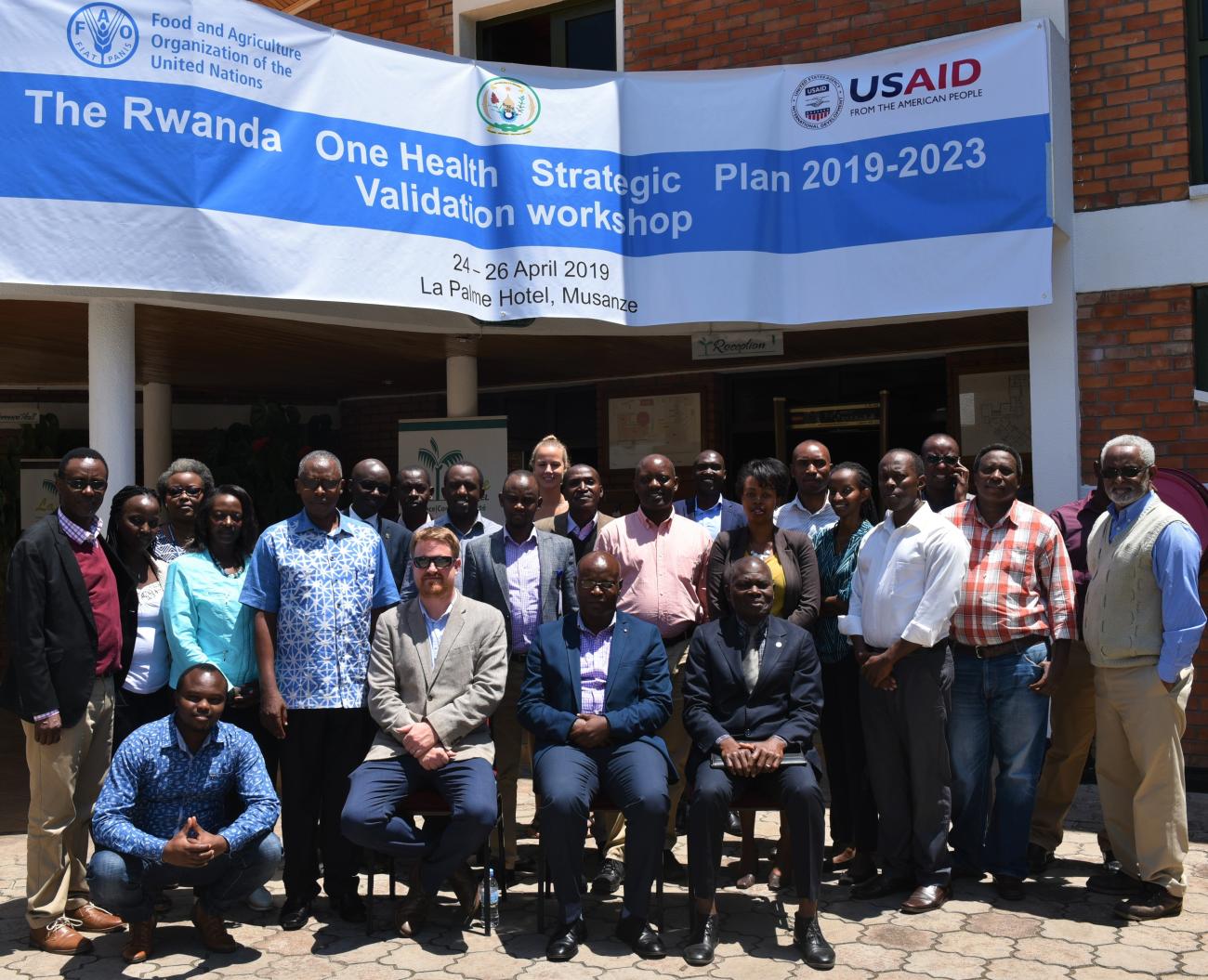Rwanda gets new One Health Strategic Plan

The new Rwanda One Health Strategic Plan II (2019-2024) has been reviewed and validated by all institutions that form the Rwanda One Health platform.
The new Rwanda One Health Strategic Plan II has marked a milestone towards the improvement of the management of zoonotic and other epidemic diseases.
This six-year strategy comes on the heels of the first strategic plan that ended in 2018.
The Food and Agriculture Organization of the United Nations (FAO), under the project 'Provision of technical support for the One Health platform in Rwanda' (and supported financially by USAID) formulated the second phase of the One Health Strategic Plan.
It outlines interventions by government institutions and other one health partners to enhance existing structures, and pool together additional resources to prevent and control zoonotic diseases and other events with public health ramifications.
The event from 24 to 26 April 2019 brought together technical officers, which reviewed and provided inputs to the final Plan. The new strategic plan envisions promoting and strengthening interdisciplinary collaboration and partnerships in a One Health approach, as well as to strengthen surveillance, early detection, rapid response, prevention and control of zoonosis, antimicrobial resistance and other public health threats. Furthermore, the One Health Strategic plan will build capacity and promote applied research at the human-animal-ecosystem interface.
A comprehensive system
To respond to emerging and persisting challenges in human, animal and environment interaction in the age of climate change, the new strategic plan proposed the establishment of a comprehensive system and protocol for the surveillance of epidemic/epizootic detection, diagnosis and rapid response.
Phaedra Henly, Director of the Division of One Health at the University of Global Health Equity (UGHE) said that the new strategy defines the future of One Health in Rwanda.
“Other countries need to take note that for its population to be healthy, and One Health needs to be a central approach. This is especially true in our rapidly changing global environment.”
Unlike the last strategic plan that ran for five years, the new plan will cover a period of six years, and will seek to address current public health concerns like Aflatoxin, Antimicrobial resistance (AMR) as well as food safety and food security through the One Health approach.
As the relevance of the platform continues to be understood, its governance has been elevated to the level of Director-General of implementing ministries - rather than heads of units as it was previously the case.
Addressing the bigger challenges
The strategy will serve as a guiding document for a collaborative, holistic and multi-sectoral approach to address complex public health challenges in Rwanda (human, animal and ecosystem interface).
The One Health Steering Committee (OHSC) comprised of experts within the One Health platform, will assume the overall coordination and oversight when it comes to the implementation of the strategy. It is they who will be responsible for the overall governance including establishing strategies, prioritizing funding allocations, advocating, and mobilizing resources.
Dr Rudakemwa, Chairman of the Rwanda Medical and Dental Council (RMDC) said:
“Competencies have been identified that will be taught to Rwandans at undergraduate, Postgraduate and those in practice.”
He feels the new plan should cultivate ownership through active engagement of all stakeholders such as universities, professionals, professional regulatory bodies and other government institutions, with proper coordination of development partners.
Putting the plan to work
The Committee shall meet on a quarterly basis to review progress in the implementation of the plan, discuss challenges and recommend remedial measures.
The acting Director General of Rwanda Food and Drugs Authority (Rwanda FDA), Charles Karangwa, representing the permanent secretary in the Ministry of Health, promised more support from the higher level of the Ministry and of other institutions involved.
The FAO Representative in Rwanda, Gualbert Gbehounou, officiating at the workshop, emphasized the importance of institutionalizing a formal multi-sectoral coordination approach, which he believes is crucial to One Health to promote prevention efforts and save time in detecting and responding to an outbreak.
Boosting the strategy
At the end of successful implementation of this strategic plan, the country will have a One Health national policy; One Health risk Communication and resource mobilization strategies; upgraded electronic surveillance systems; and One Health competencies integrated into relevant academic disciplines and training programs both pre- and in-service.
The institutions that are part of the Rwanda One Health platform are the Ministry of Health, Ministry of Agriculture and Animal Resources, Ministry of Environment, Rwanda Veterinary Council, Rwanda Medical and Dental Council, Sight and Life Foundation, Rwanda Development Board, Rwanda Food and Drug Authority, the University of Rwanda. There are other partners such as, the University of Global Health Equity (UGHE), World Food Programme, USAID-PREDICT, World Health Organization, Centers for Disease Control and Prevention (CDC), and One Health Central and Eastern Africa.
For more information on One Health, click here.






